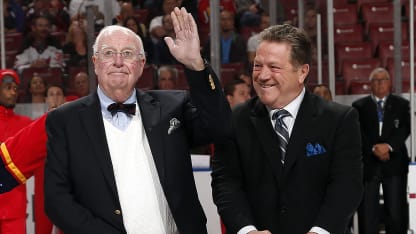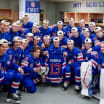"I didn't want to think about it, and Bill never said anything. I did play that night, and we ended up winning 5-2," Denis Potvin said. "It was a game that I had to play, you know? Bill's influence in our life; that's the day my dad died, and Bill Torrey is right there."
Torrey selected Potvin, then 19, with the No. 1 pick in the 1973 Draft. Since then, there have been 45 years of memories Potvin will cherish, starting with the evolution of the Islanders from an expansion team into a dynasty. And of Torrey, who would become the president of the Florida Panthers in 1993, helping Potvin with his broadcasting aspirations with the expansion team in the 1990s. And of Torrey's help and influence when Potvin's mom died in 2010.
"There's been a lot of wonderful times with Bill between 1973 and this morning," Potvin said.
Many of those wonderful times were on Long Island, where Potvin was captain from 1979-87. With Torrey as general manager and Al Arbour as coach, the Islanders were the model franchise in the NHL. They fell three wins shy of a fifth straight championship in 1984, when they lost to the Edmonton Oilers in the Stanley Cup Final. Arbour died in 2015.
"I have yet to think of a coach and general manager relationship that was so in-tuned and so needing to win," Potvin said. "They treated everybody individually. The conversations Bill and Al had with Clark Gillies or Bryan Trottier were unbeknownst to me. I knew that my conversations with those guys were private and stayed that way, and that was important for each and every one of us.
"There's never been and there never will be a team that can put a five-year span together where you go to the Final each year, win each round of those games in the five years of playoffs and lose in the final round to a great team like Edmonton (in 1984). [Torrey] of course, he was there, and Al Arbour was too my first 13 consecutive years in the NHL. My God, that in itself is unprecedented."


















